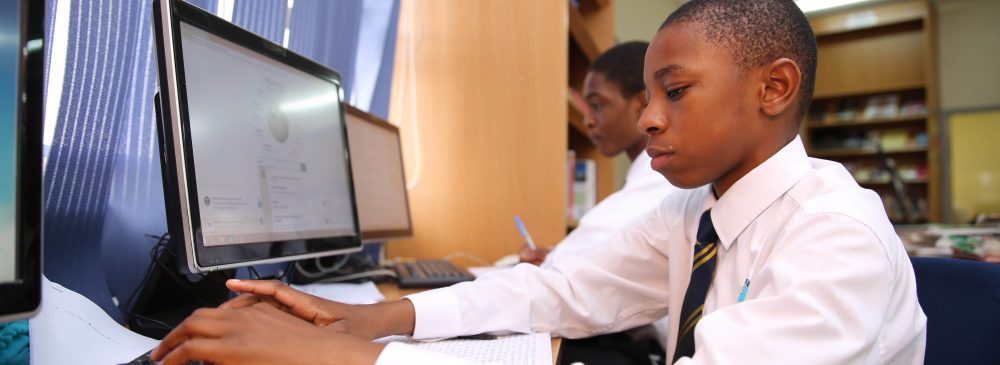
Students can also belong to the DWC’s Coding and Robotics Club. We meet once a week and have “open workshop” one day a week, after school.
Information Communication Technology is an ever changing subject. The ideas, methods and applications involved in ICT are constantly evolving on an almost daily basis. The department and the college are continuous striving to stay current in our use of digital technologies. We currently have four designated ICT suites as well as smaller clusters throughout the college.
All curriculum areas use some form of ICT on a day to day basis but within their Teaching and Learning
environment with a focus on using digital technology to refine and develop our student’s software skills.
DWC has taken huge strides to provide students and staffs with the latest technology in terms of hardware and software to enable them meet the demands of the extensive curriculum on offer. The teachers are enthusiastic about their subject and continue to develop their own skills in order to provide an interesting and varied curriculum for the students.
The majority of the ICT programme is delivered and progressed through the use of the Moodle, which is the school’s VLE (Virtual Learning Environment). The students are encouraged to use this system as their own personal network area, enabling the completion of homework and coursework directly onto the school network.
Using the computer network, Students in years 7 and 8 have the opportunity to gain knowledge skills and understanding in the areas of communicating information, data handling, modelling, multimedia and control in line with the national Key Stage 3 strategy. By the end of the Key Stage, all students should be able to use ICT securely, confidently, creatively and independently be equipped to go on to develop their skills, knowledge and understanding at a higher level.
The ICT department aims to provide all students with a wide range of software skills and basic theoretical knowledge of ICT. Our aim is to ensure that;
• Students can access enormous amounts of information quickly;
• Students can work at their own pace ensuring a personalised form of learning;
• Students can access quality material irrespective of their geographical location;
• Students can interact with peers and teachers outside the classroom.
In Key Stage 3 students will refine and enhance skills in each of the major software applications.
In year 7 the students will be completing the following topics:
1. File Management and introduction to School Network
2. E- safety project
3. Spreadsheet and Modelling
4. Presentations
5. Data Handling
6. DTP
7. Graphics
Year 8
In year 8 the students will be completing the following topics:
1. Develop a sound project using Audacity
2. Design a Movie Project using Movie maker
3. Create interactive stories, games, and animation using Scratch
4. File Management and Viruses
5. E-mail features and functions
6. Reliability and validity of information
7. Stop Frame Animation
In year 9 the students will be completing the following topics:
1. Modeling (Spreadsheet)
2. Graphics
3. Business Communication
4. Music mix
5. Video Shoot
6. Modeling
7. Data handling
Key Stage 4.
In year 10 and 11, ICT becomes optional, and if students wish to continue their ICT lessons, they can do, and will have the opportunity to gain an IGCSE qualification in ICT.
In year 10 and 11, the students will be completing the following topics:
1. Types and components of computer systems
2. Input and output devices
3. Storage devices and media
4. Computer networks
5. Data types
6. The effects of using ICT
7. The ways in which ICT is used
8. Systems analysis and design
9. Communication
10. Document production
11. Data manipulation
12. Integration
13. Output data
14. Data analysis
15. Website authoring
16. Presentation authoring
Setting / Time Allocation
Students are taught in mixed ability form groups. KS3 students have 2 lessons timetabled for each 2 week session. KS4 students have 5 lessons timetabled for ICT in a 2 week session.
Teaching Method
All lessons are very well differentiated to accommodate all our student’s learning needs. A variety of teaching methods and learning strategies are used as appropriate to the age, abilities and aptitude of the students.
Methods used include
Practical work
Case Studies
Peer Assessment Problem Solving Collaborative Work
